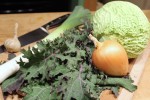We found this recipe in Deborah Madison’s cook book “[Local Flavors](<http://www.culinate.com/columns/deborah and http://www.amazon.com/Local-Flavors-Cooking-Americas-Farmers/dp/0767929497>)” years ago. The combination of kale, cabbage and beans didn’t jump out at us at first, but we tried it and we’ve loved it ever since. The dark green of the kale, light green of the cabbage and reddish-brown and white of the beans make this dish as beautiful as it is delicious. We like to serve this over chunky pasta like penne, cavatappi or rotini. Original recipe can be found at Farm Fresh to You.
- 1 large onion
- 2 leeks
- 1 bunch lacinato (or other) kale
- 2 garlic cloves
- ½ cup parsley
- 1 cup dried Jacobs Cattle (or cannellini) beans
- salt and pepper
- 2 tablespoons olive oil, plus extra to finish
First, the beans:
- Cover the beans with fresh water, add a healthy pinch of salt, and bring to a boil. Then lower the heat and simmer, partially covered, until the beans are tender, about 1½ hours.
Then, the veggies:
-
Trim and dice the onions and leeks. Strip the kale leaves from the stems and sliver them. Quarter, core and chop the cabbage. Rinse the kale and cabbage, but don’t dry them. Peel, trim and mince the garlic. Chop the parsley.
-
Warm 2 tablespoons of olive oil in a heavy wide skillet. Add the onion and leeks and cook over medium-low heat until the onion is soft but not browned, about 8-10 minutes.
-
Add the kale, cabbage, garlic, parsley, and 2 teaspoons salt. Cook with the heat on low and the pan covered until the vegetables are soft and the volume greatly reduced, about 15-20 minutes.
-
Add the beans, along with 1-2 cups of their cooking liquid, to the pot. Simmer until the greens are completely tender.
-
Taste and season with salt and pepper. Serve, drizzled with olive oil.
Notes: the beans can be cooked ahead of time, several days (up to a week) in advance. They can also be cooked in a crock pot (on low) in case you can’t be around to watch them.
If you prefer to soak your beans: We never soak beans before cooking them and haven’t had any problems. If you prefer to soak, though, cover them with fresh water for 4 hours or overnight, then drain them and proceed with step 1.

